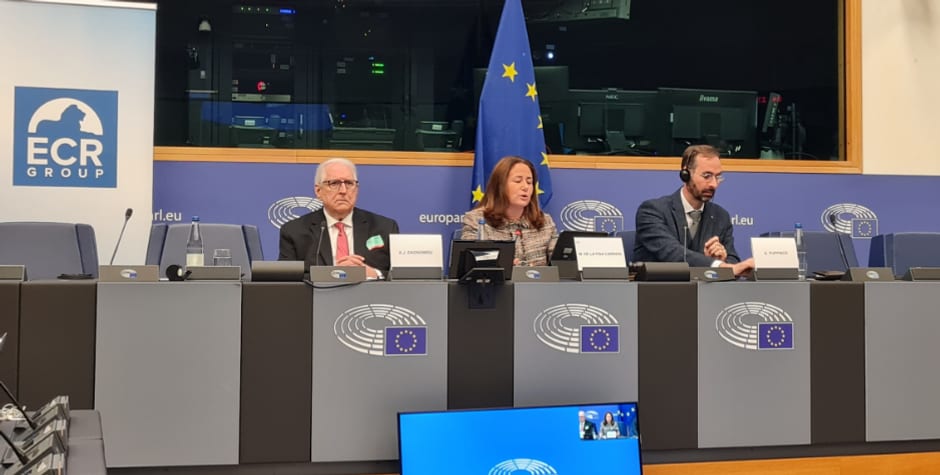Intervention of Dr Grégor Puppinck, Director of the ECLJ, at the European Parliament on November 23, 2022.
Often, proponents of abortion claim that men have no word on abortion. That we should stay silent. I don’t agree. I think that, as human being, it is my duty to speak up and say the truth. For the sake of the women, of the babies and of the society.
Abortion concerns all of us, because the baby is “one of us”, because men and women are inseparably united in all aspects of life, and especially in the greatest one : love and the gift of life. We all, men and women, have the moral responsibility to address this devastating scourge.
To this day, more than a billion abortions have been accomplished worldwide. Every year, abortion puts an end to a third of European pregnancies, with 4.5 million abortions against 8.5 million births (in the countries of the Council of Europe). Considering the scale of the phenomenon, its causes and its consequences, abortion is a major social problem of public health to which society can and must respond. It must be mentioned from the outset that the main cause of abortion is not the pregnancy itself, but the context in which it occurs. A woman undergoes an abortion, not because of the pregnancy – which is only a triggering factor – but because of particular circumstances, and the same woman, placed in other circumstances, would not necessarily resort to abortion. Abortion is thus the result of a combination of circumstances for which society is in part responsible. In fact, 75% of women who have undergone an abortion indicate having been pushed to do so by social or economic constraints.
The decision to abort often results from coercion that can take diverse forms: there are the social and medical constraints and pressures, the pressures and the irresponsibility of the father, the pressures exercised by the family, in particular on minor girls; there are also the pressures of the employer and all the material pressures. These constraints weigh directly upon the liberty of women and couples.
To claim, like an official truth, that abortion is an individual freedom, is an ideological error. It separates the question from its real causes and in the end, leads to making the woman feel guilty, since this violence apparently results from her own will, her own freedom. If abortion is but a freedom, an individual choice, then the woman is fully responsible. It is to leave her alone in the face of a violence: both guilty and victim, in an inextricable psychological situation, when this violence is largely generated, structurally, by society. One mustn’t be surprised that abortion provokes so many psychological disorders, depressions and suicidal ideas, particularly among young people. 42% of women who have had an abortion before the age of 25 experience depression. Half of the underage women who have had an abortion suffer from suicidal thoughts. Women who have abortions are three times more likely to suffer physical, mental or sexual violence than women who have carried their pregnancies to term. 89% of French women recognise that “abortion leaves psychological scars that are difficult for women to live with” and 72% of them believe that “society should do more to help women avoid having an abortion”.
We see that abortion hurts, it is not a concept nor an abstract freedom, but a bloody and harsh reality, and it is absurd to pretend that it is a “fundamental human rights” ; abortion will never be a true human right, but only a violation or a derogation to the right to life, because there cannot be any right on the existence of an innocent human being, whether you call him potential or not. Moreover, and put simply, if abortion were a true “human right”, it would give joy, and not cause sufferings, and we could show an abortion with pride.
As well, the fact that a significant and increasing proportion of medical practitioners refuses conscientiously to practice abortion demonstrates that this practice is generally immoral.
And here, in Strasbourg, the European Court of Human Rights repeatedly declared and very clearly that the European Convention of Human Rights “cannot be interpreted as containing a right to abortion”. The same is true of the United Nations where various committees look at abortion as an exception to the right to life, and never recognized any right to abortion “on demand”. The ECHR also declares that a State can, I quote, “legitimately choose to consider the unborn child as a person and protect his life”[1].
So what should we do? What is the way forward?
On one hand, we have to fight and defend the society against the relentless lobby of the abortion industry which pushes for always more abortion.
One the other hand, we have to promote public policies aimed at preventing abortion. We need to do both.
First, defending the society against the abortion industry.
The abortion industry and lobby have billions of dollars, and are deeply infiltrated within international institutions, including this parliament, but also the WHO, or the UN, or even within the ECHR. As an illustration, the abortion industry and lobbies finances massively the WHO division in charge of population control, as well as they employ and finance several U.N. experts. The UN expert on the right to health is a professional militant and practitioner of abortion that describes abortion as “a radical act of self-love”. This person has been appointed to this top U.N. official position because of her commitment to abortion.
The abortion industry has a very simple agenda : always more abortions and more public funds. They push for abortion without limits, and for any reason, everywhere, anytime, even during delivery. Regarding the money, keep in mind that the abortion industry gets paid for each abortion they do, and that they own patents on many abortive and contraceptive pills and devices. It is a huge business, in addition to being a huge issue in regard to controlling the demography of the poor countries.
They are not democrats, nor liberal.
They are not democrats: They do not allow debates on abortion, and often use intimidation, verbal and physical violence in order to silence anyone willing to defend the victims of abortion. Abortion has been legalized, in many countries, not through parliaments, but judicial activism, generally against the will of the majority. This is why the US Supreme Court Dobbs decision is excellent: it sends back this issue to the People.
The promoters of abortion are not liberals either : they push to deprive medical practitioners from freedom of conscience, to deprive the parents from their responsibilities and rights, they push to suppress the freedom of speech against abortion, they push to forbid pregnancy help centres, they litigate in Courts in support of racist, sexist and eugenic abortions, as well as to support partial birth abortion and neonatal infanticide. They are not only against life, but also against freedoms.
They are not democrats, nor liberals, because they know that abortion on demand is intrinsically immoral and not defendable. This is why they want to make it a “dogma” through its inscription into the EU Charter and the national constitutions. However, it will not change the very reality of abortion. This is pure legal positivism.
So, against the abortion industry, we have to defend true human rights and justice in courts and parliaments, on all fronts.
One the other hand, as I said, we have to promote public policies aimed at preventing abortion.
We have to understand that abortion is not a fatality; several countries have managed to reduce the recourse to it through prevention policies. In Italy for example, the number of abortions fell by 56% in the last thirty 2013, reaching 100 000, meaning less than half of the number in France. In the United-States, the teenage pregnancy rate was reduced by half between 1990 and 2010. The same is true for other countries. Currently, the social and pro-family policy implemented in Hungary shows that this is possible. Just in the first five years of this policy, between 2010 and 2015, the number of abortions in Hungary fell by 23%. In the meantime, there are twice more marriages and more births. This progress was reached without changing the law on abortion.
Reducing the use of abortion is not only a duty for the good of women, children and society as a whole, it is also a legal obligation undertaken under international law. The Governments committed to provide a “protection and assistance as broad as possible” to the family “as long as it has the responsibility of maintaining and educating children in its care”. States thus have the obligation of providing support to women and couples who do not feel capable of welcoming a child. States have also committed to protecting motherhood, before and after birth. Thus, for example, by ratifying the International Covenant on Economic, Social and Cultural Rights, States recognise that a “Special protection should be accorded to mothers during a reasonable period before and after childbirth” (art.10). States have also recognized, through the Declaration and in the Convention of the Rights of the Child, that "the child, by reason of his physical and mental immaturity, needs special safeguards and care, including appropriate legal protection, before as well as after birth". In a more precise manner, States have taken the commitment to reduce the recourse to abortion. In that respect, during the International Conference on Population and Development of 1994, in Cairo, the governments committed to, I quote, “reducing the recourse to abortion” and to “take appropriate measures to help women avoid abortion”. The Council of Europe Assembly also called the European States to “provide concrete counselling to help women who are asking for an abortion because of familial or financial pressures” (PACE, 2008). A policy of prevention of abortion must answer the social and economic causes because of which a pregnancy comes to be called “unwanted”: affective immaturity, fragility of families, economic precarity, narrowness of the accommodation, professional difficulties and constraints, and so forth. To most of these causes should, normally, respond the different “social rights” that the States committed to guarantee. Indeed, the European Social Charter guarantees in particular, the right to accommodation, the protection of the family, the protection of motherhood, the protection of life before birth or even the conciliation of family life with professional life, and so forth.
So while the pro-abortion industry continues to push for always more abortions and money, there is, on the other side, a lot of good work to be done in order to prevent abortion and to help and support women and families. As a result, I’m convinced that reducing abortion will be beneficial to all of us.
I thank you.
[1] ECHR, A. B. C., v. Ireland, GC, n° 25579/05, 16 December. 2010, § 222, confirming Vo v. France, GC, n° 53924/00, 8 July 2004.














